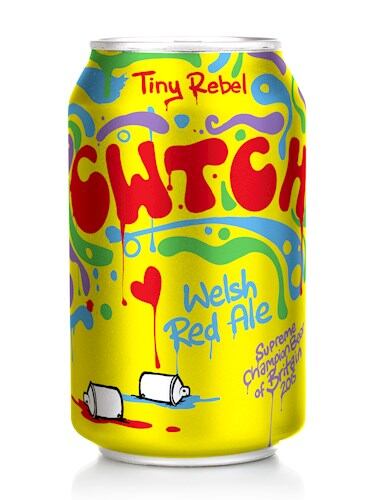The 330ml can uses graffiti style graphics, bold colors and a picture of a bear.
The Portman Group said that, while it was clearly not the intention of the brewer to promote immoderate consumption, companies must be ‘extremely vigilant’ in using themes that could appeal to young children, given the association of 330ml cans with soft drinks.
Tiny Rebel has changed its cans: but says the process has taken five months of work, nearly £30,000 ($40,000) in costs, and ‘a fair bit of stress’.
330ml cans: the domain of soft drinks or beer?
The Portman Group, the UK alcohol industry’s self-regulating body, says that an alcoholic drink, its packaging and any promotional material “should not in any direct or indirect way have a particular appeal to under-18s”.

Tiny Rebel Brewing says it had included several cues on the packaging to show it was beer: the words ‘Welsh Red Ale’ displayed prominently on the can; a statement of alcohol strength at 4.6% ABV as well as the number of units and a reference to drinkaware.co.uk, and the word ‘beer’ in 16 languages including Welsh and English.
Tiny Rebel added that cans have become popular among craft beer brands, while the price of Cwtch (£2.30) also helps differentiate the product from a soft drink.
The brewery said the can’s imagery – psychedelic patters inspired by 1960s cliché and Austin Powers – would, in fact, appeal to adults by inspiring a nostalgic feel from their teenage years.
But the Portman Group said that the presence of graffiti and a bear wearing a hoodie would still be used to market to teenagers today.
The Group therefore concluded that “the prominence, in size and positioning of the bear and “Tiny Rebel”, in combination with the other elements on the front label, caused the product to have a particular appeal to under-18s.”
Does creativity need defending?
Tiny Rebel has made changes to its cans: but says the ruling could hamper creativity for the whole industry.
“This sets a precedent, but the boundaries on that precedent aren’t clear and the decisions are enormously subjective, and take in a very limited view of the world,” it says.
“There is no clear difference between what is and isn’t allowed, and that’s a major problem.
“It forces companies to be over-cautious in design, which is inherently limiting. Instead of designing something for what consumers would like, companies have to design bearing what the most prudish among us wouldn’t like.”
Tiny Rebel says it found the Portman Group – whose nine members include AB InBev, Diageo and Heineken - to be ‘an alright bunch’; and has worked with the group over the past five months on the redesign of the can.
However, it points out that there are no craft, indie or micro breweries involved in the organization.
“This ruling requires us and our branding to evolve. We think it’s fair for us to ask the same of the regulator. And by speaking up and communicating publically, we’re doing all we can to put the 'self' in 'self-regulation'.
“This isn’t about us. This is about the defence of fun and creativity.”
